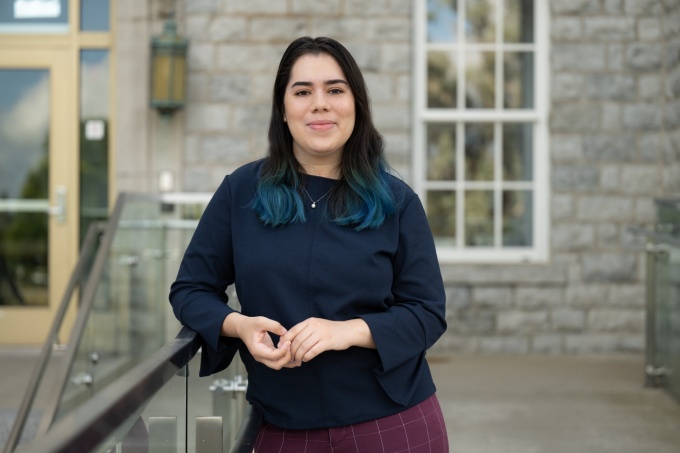Why I'm Here: Meet Our Students

Jessica Mencia, PhD student
by Jana Eisenberg
During the pandemic, as Jessica Mencia got deeper into her PhD work, she kept in mind what she’d heard during her MSW coursework at UBSSW. “I remember what Joyelle Tedeschi (Joy), the instructor of our Community Social Work course, said about community integrated research. She’d remind us to not get caught up in only being a researcher; when looking for solutions or interventions, we also need to ask people what they need.”
“I discovered that I like working with younger adults, teenagers/adolescents,” Mencia said of her current focus on those populations’ sexual risk-taking behaviors during the pandemic. “People that age often don’t feel heard. During my research I’m asking people to tell me their stories. When they do that—especially young people, women and non-binary youth—they make themselves vulnerable; Joy reminded us that it’s important to honor them. Many who I’ve interviewed say they feel validated, and that’s also important to me.”
Mencia, who grew up in North Carolina, was not originally thinking about a PhD in social work. Her interest in public health led her to a University of North Carolina Chapel Hill undergraduate program; she majored in public policy. As the first in her family to earn a college degree, and a Latina, she felt connected to the subject matter.
“Policy coursework felt tangible; I understood the issues, and through the program, I gained skills to do something about it,” she said. “I want to make change and make a difference; I saw privileged people making decisions that affected others and wanted to see more marginalized people at the table.”
While at UNC, Mencia volunteered for the Carolina Abortion Fund, a nonprofit, confidential, toll-free helpline providing financial, practical, and emotional support to callers in North and South Carolina trying to access abortion care. “When I was younger, abortion—rights, access, etc.—was not spoken about as openly,” said Mencia. “But adults in my life made sure I understood that it was crucial to support people in those rights.”
As part of the McNair Scholars Program, which works to increase graduate degree awards for underrepresented students, Mencia decided to pursue a PhD. (Like most fields, social work PhD programs require that those pursuing the degree must have a master's to apply.) She discovered that Buffalo, and the UBSSW program’s dual MSW/PhD program, would be a good ft. She moved from North Carolina to Buffalo in late 2019 and earned her MSW in 2021.
The MSW program gave her valuable insight. “Policy work tends to be macro-focused, with a broad perspective, so in my first MSW year, it was nice to get some micro-skills, like one-on-one counseling,” she said.
The next year of the MSW program expanded her knowledge and experience. “Learning about community social work was applicable to my interests. Thinking about how, as researchers, we are strangers coming into communities,” said Mencia. “In one of my favorite courses, we worked with Gay & Lesbian Youth Services Western New York, researching what queer students in rural WNY needed to feel safe. It felt good to ask the community what they need, rather than imposing it.”
Her initial PhD research remained focused on abortion rights, informed by her time at the Carolina Abortion Fund. “Being part of the call line; seeing the number of callers, and hearing some of their stories, made me realize these intersecting barriers affecting people; and seeing how set some people—and policies—were on making it inaccessible.”
UBSSW’s faculty and school culture have added to Mencia’s positive experience. “I’ve connected with a lot of people—faculty, advisers and students,” she said. “The school’s general culture is very curious; it’s nice to have people interested in your research. It can be scary to come into a new program. I found the UBSSW PhD students very supportive; they want to make sure that others succeed.”
“Advisers and faculty have also looked out for me. Through the program and its fellowship, I’ve had opportunities to travel and present at conferences; to share my research with an even larger community,” she said.
Mencia’s direction for her dissertation is shifting to her more recent interest, sexual risk-taking in young women and non-binary youth during covid. But her longer-term goals still hearken back to her original motivation for starting her higher education journey: advocacy and research, possibly working for a research institution or think tank. “I want to be involved with government policy,” she said. “Maybe it’s social work with a policy twist. I want to make sure that the research I do is accessible to the communities it impacts.”